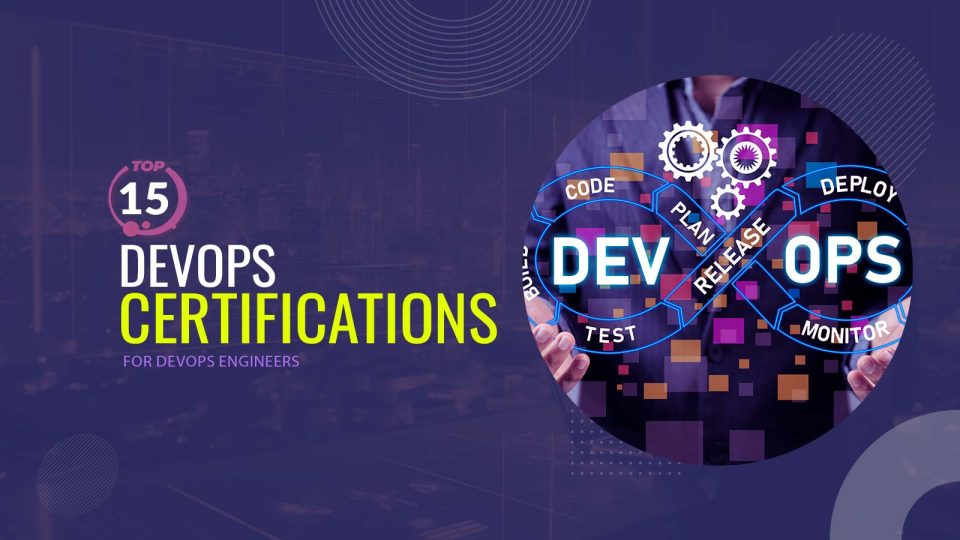The domain of DevOps is expanding, merging software development and IT operations to expedite the production and dissemination of top-notch software. Securing a certification in this field can greatly benefit your professional development with the increasing demand for skilled DevOps professionals. DevOps Certification can benefit professional development with the growing demand for skilled professionals.
This article will give you the benefits of obtaining a DevOps certification and how it can help you advance your career. A DevOps certification can unlock myriad avenues for professional advancement, enriching your expertise and competencies while rendering you increasingly indispensable to prospective employers.
Defining DevOps
DevOps combines software development and operations. It is a software engineering methodology that aims to integrate the work of development and operations teams by nurturing a culture of collaboration and shared responsibility.
Key DevOps Principles
- Automation of the software development lifecycle, encompassing testing, builds, releases, environment provisioning, and other manual tasks that can slow down or introduce errors in the software delivery process.
- Emphasis on collaboration and communication, recognizing that while automation is crucial, effective teamwork enhances overall performance.
- Commitment to continuous improvement and waste reduction manifested through automating repetitive tasks and constantly seeking opportunities to enhance performance metrics and shorten release times.
- Laser focus on user needs with short feedback loops, facilitated by automation, enhanced communication, collaboration, and ongoing improvement efforts to ensure software aligns with user expectations and requirements.
Benefits of DevOps
#1 DevOps on AWS
The AWS Certification demonstrates proficiency in testing and deploying AWS applications and infrastructure, showcasing expertise in cloud platforms such as implementing and automating compliance validation, governance processes, and security controls. Recognized as the premier cloud computing platform, AWS certification is highly sought after, with numerous AWS-certified DevOps engineer positions.
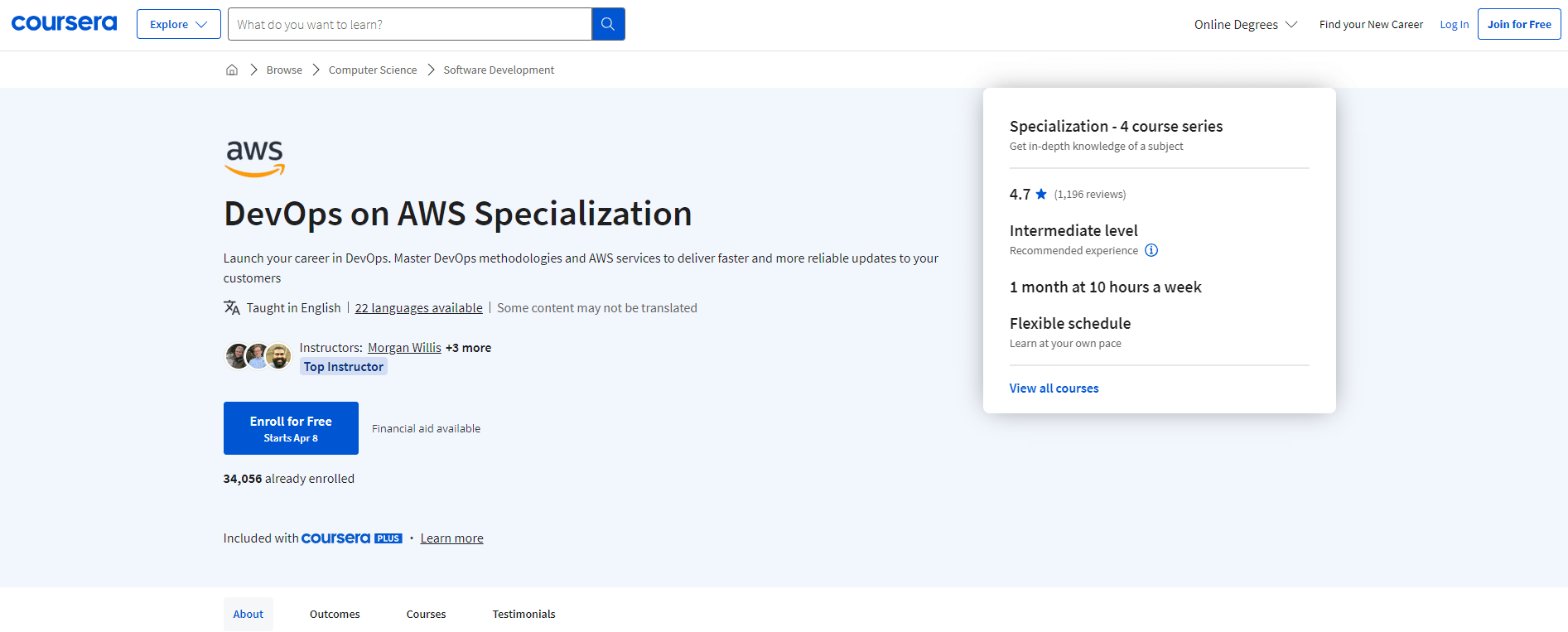 Who it’s for: DevOps engineers specializing in cloud technology, particularly within an AWS framework.
Who it’s for: DevOps engineers specializing in cloud technology, particularly within an AWS framework.
Recommended experience: Two or more years of hands-on experience in AWS environments and proficiency in coding with a high-level programming language.
#2 Azure DevOps Solution Certification Exam
Exploring Microsoft Azure, a leading cloud computing service akin to AWS and Google Cloud Platform, offers extensive services encompassing web servers, email servers, databases, file storage servers, virtual machines, user directories, and beyond. Integration of Azure with DevOps streamlines and accelerates the entire DevOps lifecycle, ensuring swifter and more dependable deployments. Consequently, the Azure DevOps Engineer Expert certification stands among the top-tier DevOps certifications, coveted by Azure professionals aspiring to excel in their roles as DevOps engineers.
Within the realm of Azure certifications, the Azure DevOps Engineer Expert certification serves as a testament to the proficiency and capabilities of Azure DevOps professionals. Primarily targeted at Azure professionals already engaged as DevOps engineers, this certification validates their adeptness in designing and implementing DevOps best practices across various facets such as version control, build, release management, compliance, testing, and infrastructure as code, leveraging Azure technologies to their fullest potential.
About the Exam
Requirements: Azure Administrator Associate and Azure Developer Associate
Cost: $165
Duration: 170 minutes
Question Type: 40-60 MCQs
Test Syllabus
- DevOps Strategy designing
- Continuous integration
- Continuous delivery
- Application infrastructure
- Dependency management
- DevOps development processes implementation
#3 DevOps Engineer Expert
DevOps Engineer Expert is a Microsoft certification. As a DevOps engineer, you are a developer or infrastructure administrator with subject matter expertise in working with people, processes, and products to enable the continuous delivery of value within organizations.
The responsibilities associated with this role include designing and implementing strategies for collaboration, code, infrastructure, source control, security, compliance, continuous integration, testing, delivery, monitoring, and feedback.
DevOps engineer needs to work on cross-functional teams that include:
- Developers
- Site reliability engineers
- Azure administrators
Certification Prerequisites:
- Azure DevOps
- GitHub.
#4 Google Professional DevOps Engineer
Google Professional DevOps Engineer certification is an advanced certification that helps cloud engineers build DevOps solutions and develop a DevOps mindset while using Google’s cloud solutions.
This certification can be useful for thousands of companies that use any of Google’s cloud solutions. Cloud engineers, solutions architects and experienced cloud administrators are best suited for this certification.
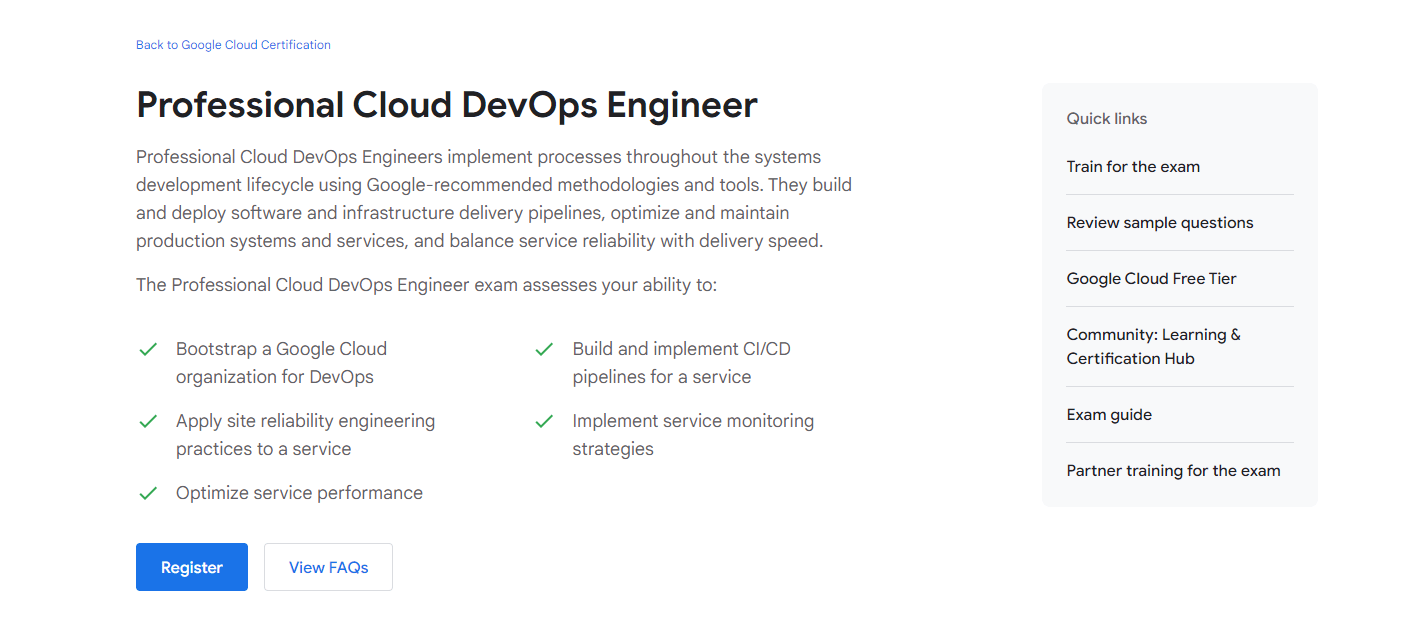 The course will challenge you with the following:
The course will challenge you with the following:
- Applying site reliability engineering principles to a service
- Developing and implementing CI/CD pipelines for a service
- Service monitoring strategies implementation
- Optimizing service performance
- Managing service incidents
Validation: 2 years
Requirements: 3+ years of industry experience, with 1+ years of Google Cloud solutions management experience.
Exam details: two hours to complete 50-60 questions
#5 Linux Professional Institute DevOps Tools Engineer Certification
The Linux Foundation’s certification for Linux system administration is ideal for anyone with experience in Linux or open-source operating systems.
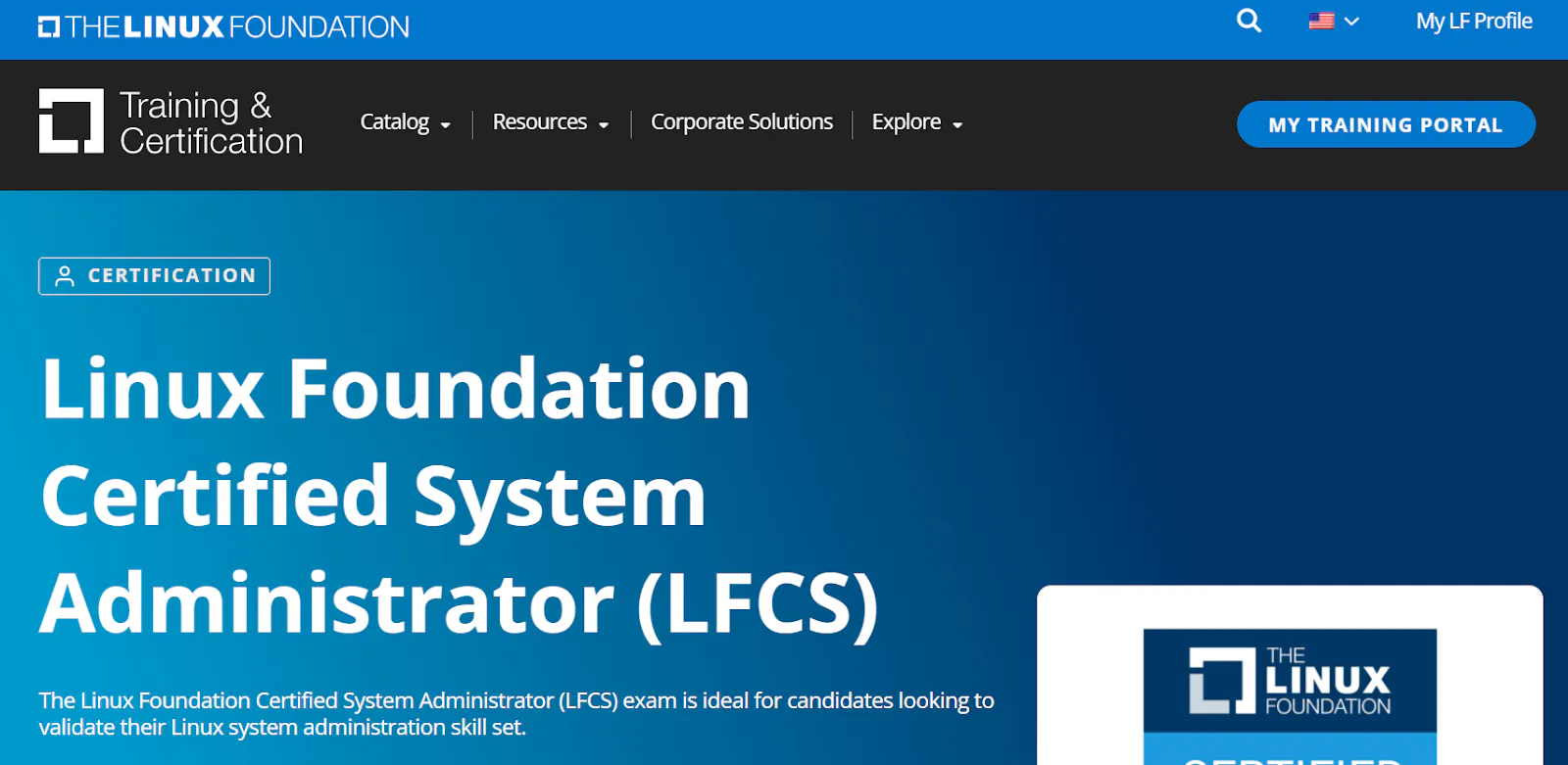 Exam Duration: 2 hours
Exam Duration: 2 hours
Valid for: 3 years
Requirements:
Exam candidates don’t have to meet any requirements.
Certification Curriculum:
- Service Configuration
- Operation of Running Systems
- Essential Commands
- Networking
- Storage Management
- User and Group Management
Candidates can choose between CentOS 7 or Ubuntu 18 for their performance-based exam, where they simulate real-life scenarios faced by system administrators in the workplace.
#6 Docker Certified Associate
The Docker Certified Associate (DCA) is a certification for Docker practitioners with relevant experience working with Docker. Docker is a DevOps tool to confirm the skillset with real-world problems designed by experienced Docker practitioners.
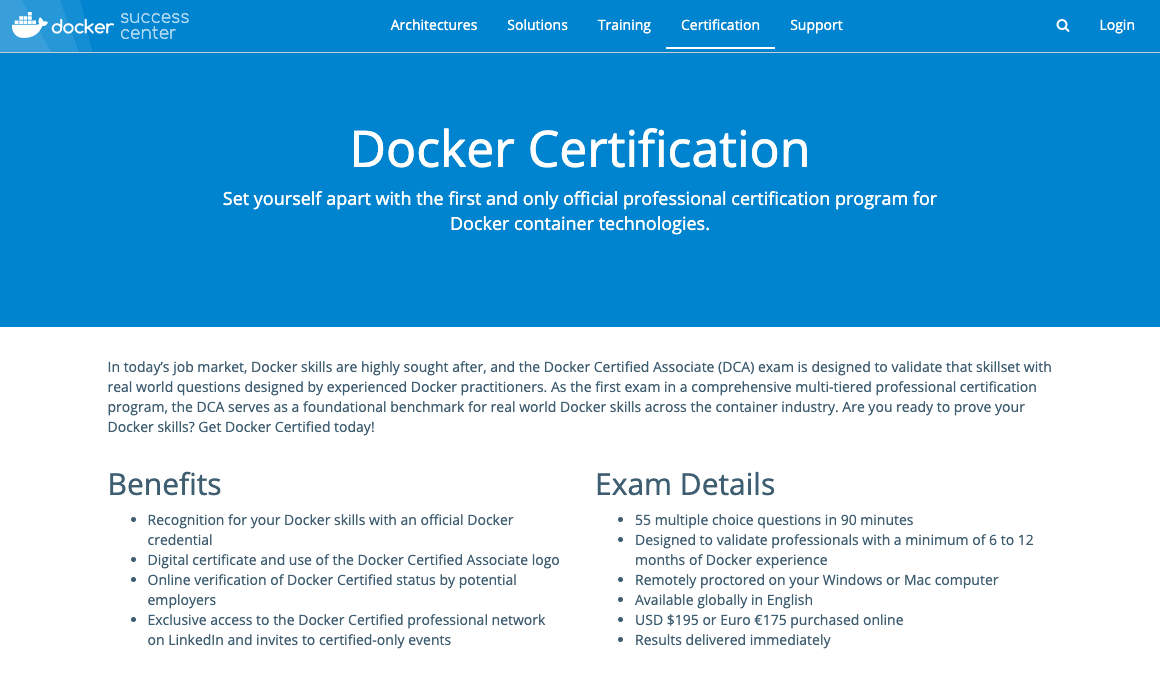 Requirements: At least 6 months of experience Docker Practitioner
Requirements: At least 6 months of experience Docker Practitioner
About the Exam
Duration: 90 mins
Question Type: 55 MCQs
Benefits:
- Acknowledgment of Docker skills with official Docker credential.
- Use of the Docker Certified Associate logo and Digital certificate.
- Online verification of Docker Certified status by the potential employer.
- Access to LinkedIn’s Docker Certified professional network and invites to certified events.
#7 Cloud DevOps Engineer Nanodegree Certification
Companies are looking for talented DevOps Engineers to remain competitive in the agile world. This certification allows candidates to learn how to operate the infrastructure at scale and deliver services and applications quickly. This is a vital skill that will help DevOps engineers advance their careers. Infrastructure as code, monitor CI/CD pipelines and deploy microservices that scale using Kubernetes.
Course Features:
Duration: 4 months
Level: Intermediate
Effort:10 hours per week
#8 Certified Kubernetes Application Developer (CKAD)
This is an advanced certification, the next step after the KCNA certification. KCNA validates the candidates’ basic understanding, which shows that the candidate is more hands-on and can build, test, and deploy cloud-native applications leveraging Kubernetes. The exam tests candidates based on the knowledge of the following:
- Application deployment
- Application environment, configuration and security
- Application observability and maintenance
- Services and networking
- Application design and build
Validity: The certification is valid for three years
Recommended for: Kubernetes engineers, cloud engineers and IT professionals who work with cloud-native applications in Kubernetes.
Requirements: To pass the exam, hands-on experience with Docker and Linux is needed.
Exam details:
Time: 2 hours
Questions: 15-20 performance-based tasks
Minimum Score: 66% and above
#9 Puppet Professional Certification
Puppet empowers DevOps professionals to automate infrastructure changes, accelerate software delivery, and improve quality. This powerful system management tool automates and simplifies server configuration tasks. Earning the Puppet Certified Professional credential demonstrates your ability to leverage Puppet’s full potential with skills that bridge technical knowledge and real-world experience.
What you’ll learn:
- Classification strategies
- Troubleshooting Puppet code
- Module authoring
- Orchestration and tasks
- Environments
- Administration
- Puppet language concepts
Who should get certified:
- DevOps engineers
- IT professionals
#10 Become a Cloud DevOps Engineer- Nano-degree Program
This Cloud DevOps Engineer Nanodegree program equips you with the expertise to build, deploy, and manage applications at scale.
What you’ll learn:
- Cloud Fundamentals: Master the core concepts of cloud computing, from security and networking to storage and management services.
- Infrastructure Automation: Learn to automate infrastructure provisioning and configuration for efficient cloud operations.
- CI/CD Pipelines: Build robust CI/CD pipelines to streamline software delivery and ensure consistent deployments.
- Microservices with Kubernetes: Gain practical experience with Kubernetes, a container orchestration platform for managing microservices at scale.
Prerequisites:
Solid foundation in Linux command line
Course Details:
Platform: Udacity
Duration: 4 months
Ideal for:
- IT professionals looking to transition to cloud roles
- Developers seeking to expand their skillset into DevOps
- Anyone passionate about building and managing cloud-based applications
#11 HashiCorp Certified Terraform Associate
Terraform, an open-source tool from HashiCorp, is an infrastructure-as-code (IaC) game-changer. Similar to Puppet, it automates infrastructure tasks across various cloud providers. Terraform certification validates your ability to leverage this powerful tool for:
- Standardization & Efficiency: Boost productivity in large organizations by automating and standardizing infrastructure provisioning.
- Cloud-Agnostic Expertise: Learn to manage infrastructure across diverse cloud platforms.
Get Certified: What You’ll Need to Know
The Terraform Associate Certification assesses your understanding of:
- IaC Fundamentals (core infrastructure-as-code concepts)
- Terraform Basics & Purpose (working with Terraform’s core functionality)
- Terraform CLI Mastery (using the command-line interface effectively)
- Modular Infrastructure (working with reusable Terraform modules)
- Terraform Workflow Management (navigating the infrastructure provisioning process)
- State Management (implementing and maintaining Terraform state files)
- Configuration Management (reading, generating, and modifying infrastructure configurations)
- Cloud Features (understanding Terraform Cloud and Enterprise capabilities)
What to Expect:
- Hands-on experience with Terraform is recommended.
- Terminal skills, cloud architecture, and basic cloud understanding are beneficial.
- Entry-level certification: No formal work experience required.
- Exam duration: One hour.
- Certification validity: Two years (regular updates ensure continued relevance)
- Study resources: HashiCorp provides official study and review guides.
#12 CloudBees CD/RO Admin Associate Certification
The self-paced CloudBees CD/RO Essentials course commences with an exploration of terminology and concepts, illuminating the interconnections among the components of the CloudBees platform. Subsequently, it covers the core features to elucidate its purpose and functionality, reserving detailed operational aspects for subsequent courses. While this course lacks a lab environment, learners engage with various media formats throughout, fostering familiarity with CD/RO’s fundamental capabilities. Additionally, this content serves as preparatory material for the CloudBees CD/RO Essentials certification exam.
The course lasts approximately 1 hour, though individual completion times may vary.
Upon completion, learners can pursue the CloudBees CD/RO Essentials certification.
Key Learning Objectives:
- Enumerate and elucidate key CloudBees DevOps terms.
- Describe the interrelations between CD/RO and the principal components of the CloudBees platform.
- Provide an instance of CD/RO management at scale.
- Outline Deployment Automation Concepts.
- Explain Release Orchestration and offer an illustrative example.
- Describe Reporting capabilities.
Audience:
This course is ideal for those curious about CloudBees and individuals interested in the deployment capabilities of CloudBees CD/RO. It is designed independent of specific technical roles and offers valuable insights to learners of all proficiency levels.
Prerequisites:
- Basic comprehension of software development, delivery, and operations principles.
- Desirable: General IT business knowledge or basic IT technical understanding.
Free DevOps Certifications
#13 GitOps Certification with Argo
Codefresh, a platform for cloud-native apps, offers free training and certification on GitOps with ArgoCD. GitOps is a sought-after skillset for organizations adopting microservices and container orchestration frameworks like Kubernetes.
#14 Certified Calico Operator: Level 1
Calico is the CNI plugin for Kubernetes and is one of the commonly used CNIs for setting up Kubernetes clusters. Tigera, the company that developed Calico, offers a free certification specifically for Calico operators. The certification can help you gain knowledge about the Kubernetes network plugins.
#15 DevOps Culture and Mindset
This DevOps culture and mindset is a free course that offers core principles of DevOps, focusing on the cultural shift that fosters better collaboration between developers and operations teams.
The course also helps understand how DevOps leverages Lean principles to optimize workflows and accelerate software delivery.
This course is ideal for:
Engineers with technical expertise are seeking a deeper understanding of the DevOps philosophy.
Ready to dive in? No prior knowledge is required, although basic familiarity with technical tools and processes is helpful.
Duration: 3 weeks (approximately 14 hours)
Future Outlook
The future of DevOps will witness significant advancements in tooling and organizational strategies while upholding its fundamental mission. Automation, particularly by integrating Artificial Intelligence for IT operations (AIOps), will accelerate DevOps transformations. AIOps will streamline operational tasks and enhance service uptime by leveraging machine learning, performance baselining, anomaly detection, automated root cause analysis, and predictive insights. AIOps tools will empower DevOps teams with real-time analysis, proactive issue detection, and improved collaboration. Additionally, the future of DevOps will emphasize cloud optimization, leveraging the centralized nature of cloud technologies for enhanced testing, deployment, and production processes. As organizations embark on this journey, they must recognize that DevOps is an evolving paradigm, with goals and expectations evolving.
FAQs
1. What are the goals of DevOps?
The goals of DevOps encompass achieving faster deployment frequency, reducing time to market, minimizing failure rates of new releases, and enhancing mean recovery time. DevOps aims to expedite development and deployment cycles by implementing continuous testing, ensuring quality assurance, advancing feature development, and facilitating maintenance releases to enhance reliability and security.
2. Are DevOps and DevSecOps different?
DevOps is the combination of development and operations teams. DevSecOps is where security is added to DevOps and integrated across all stages of the process chain from start to end.
3. In which industries are DevOps organizations prevalent?
DevOps is on-demand across industries, from small and medium-sized businesses (SMBs) to large enterprises. It is a necessity for breaking down operational silos within organizations. DevOps has introduced a new paradigm of software culture characterized by collaboration and improved communication, demonstrating its relevance and applicability across various sectors.
4. What is the difference between DevOps in IT and DevOps in IoT?
The primary contrast lies in expanding considerations from software codes to encompass physical components, devices, and legacy systems in IoT DevOps. This introduces added complexity to the automation process. Specific challenges include fragmented development pipelines, automated Build-Verification-Test (BVT) plans, extensive use of legacy systems, varied release cadences, and transitioning the production environment to a singular code. For further insights, we recommend reviewing the white paper “DevOps in the Age of Connected Devices” authored by eInfochips subject matter experts.
[To share your insights with us as part of editorial or sponsored content, please write to sghosh@martechseries.com]


